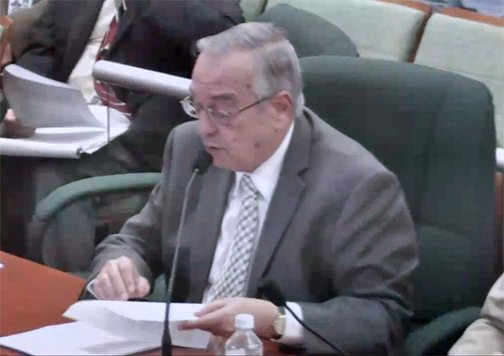Economists: Don’t tax education, fiscal growth plan vital

Several prominent Puerto Rican economists urged lawmakers on Monday to exempt educational institutions from the proposed 16 percent value-added tax being discussed as part of a sweeping tax reform for the island.
During a public hearing by the House Finance Committee, economists Ramón Cao, and Antonio Fernós-Sagebién agreed education should be seen as an investment and not an expense, which should not be taxed, as House Bill 2329 proposes. Among other things, the tax reform proposes migrating from the current sales and use tax system (known as the IVU in Spanish) to a VAT.
“The trend in Europe is that educational services have a zero tax rate. Why should we subsidize public education and not private, if the goal is the same?” said Fernós-Sagebién, a professor at the School of Economic Sciences at the Inter American University in San Juan.
Economist Ramón Cao said while it has been argued that private education is “optional,” there are still some expenses that have higher priorities than others.
“There are valid reasons for responsible parents to choose private education for their children, despite the economic costs they entail,” Cao said. “I cannot think of any reason why the government should penalize those parents.”
In his testimony, Cao suggested imposing a zero tax rate, or granting an exemption entirely, on private education.
“Education is an investment in human capital. By definition a consumption tax should tax consumption — not investments, productive activities or those that promote greater economic productivity,” he said. “Suggesting a VAT on education, whether private or public, contradicts the purpose and even the definition of that tax.”
Saying there are “many reasons why Puerto Rico’s economy fell into this crisis,” Fernós-Sagebién pointed out that the economic model the island has had in place for decades is no longer useful.
“We have not been able to create another viable economic model that stimulates the economy and achieves steady economic growth,” said Fernós-Sagebién. “And this will not be changed by the IVU or the VAT.”
In his testimony, Economist Gustavo Vélez outlined the multiple taxes passed between 2006 and 2014, saying that although they have shored up $11 billion in additional revenue, the government is still operating with a structural deficit of about $1 billion.
“Clearly the fiscal problem lies not in a lack of revenue, but on excessive public spending and the government’s own inneficiency,” he said. “The ongoing tax hikes have only served to exacerbate the economic downturn, which in turn reduces the production base, and provoked a vicious circle which has trapped the island from 2006 to the present.”
Economic development plan needed
Economists testifying in both chambers also agreed the proposed tax reform needs to be coupled with a comprehensive economic development plan to succeed in pulling the island out of its fiscal conundrum.
“The discussion should be comprehensive, there is a need for the tax reform to be accompanied by an economic development plan to tie those fiscal targets to the objectives to promote investment,” said Rosario Rivera, president of the Puerto Rico Economists Association. “Otherwise, the aims of the reform can be lost, or may lose some and not others and not necessarily achieve the expected effect.
The four-member panel at the Senate hearing held by the Public Finance Committee also included economists Juan Lara, Vicente Feliciano and Antonio Rosado, who said the proposed reform is “the biggest change in Puerto Rico’s tax system since 1954.”
“This is every economist’s dream. This proposed structure definitely encourages capital investments,” said Rosado, while recommending that the VAT be applicable to unprocessed foods so that there is fairness versus taxing processed foods and “to reduce the possibility of evasion, while expanding the tax base.”
Meanwhile, Feliciano said the proposed overhaul of the current tax system — which would among other things migrate from a sales tax structure to the VAT — is “the right decision for Puerto Rico.”
“There may be amendments but the general structure is correct. The current system promotes evasion and consumption,” he said.
In response to questions by Committee Chairman Sen. José Nadal-Power regarding the effects the VAT would have on small- and mid-sized business sector commercial rents, Feliciano said the impact would be zero.
“When a lawyer sells their services and charges the VAT, before forwarding it to the Treasury they ask for a credit. The idea of exempting commercial establishments is unnecessary and contrary to the philosophy of a value-added tax,” Feliciano said.
Finally, Lara told lawmakers it is important for the Government Development Bank to have enough liquidity to sustain a transition from the IVU to a VAT.
“The transition is an important issue. There will be a reduction in the [sales and use tax] uptake at the beginning of the implementation process of the VAT, this points to the need the central government may have for liquidity to lubricate this transition,” Lara said
On this point, Senate President Eduardo Bhatia was emphatic in saying that the government had to be mindful of having the necessary buffers in place to minimize the impact of a transition.
During the hearing at the House, several of the economists agreed that the VAT will neither have an inflationary nor domino effect on the local economy. However, they warned it could have a regressive effect on the poor working class and suggested granting a work credit for those earning less than $30,000 a year and do not receive government assistance.















